Critics say city’s image at stake amid complaints about horror taxi rides, rude cabbies and lack of epayment solutions. Government caught in ‘deadlock’ as it vows to stamp out bad taxi behaviour, but still targets illegal ride-hailing platforms despite their popularity. — SCMP
Business consultant Jackson Leung, 28, fractured a rib when the Hong Kong taxi he was riding in crashed into another vehicle while the cabby was distracted by orders arriving over multiple smartphones on his dashboard.
“It was a complete nightmare,” he recalled. “The taxi driver was inattentive the whole time, picking up orders non-stop, and in the end he hit another vehicle.”
He was hospitalised for his injuries and also suffered from post-traumatic stress disorder.
“After my recovery, just thinking of the accident made me shudder,” he said. “I’ve tried to avoid taking cabs and hail Uber instead, except when it charges unreasonably high rates.”
For Leung, the accident only added to the many ways Hong Kong’s taxi service and cabbies fell short.
“Apart from cabbies refusing fares and cherry-picking passengers, I have regularly come across ageing taxis without sufficient air conditioning,” he said. “The lack of epayment methods and a central app platform also hurt the taxi industry.”
More competition would force the industry to upgrade and improve, he said, adding that would happen if ride-hailing was legalised.
“The government should regulate Uber-like firms so passengers have a wider choice of personalised point-to-point rides,” Leung said.

He is among the city’s taxi users who have a litany of complaints and want more competition in the market.
The quality of taxi services has remained in the spotlight with persistent complaints about drivers who overcharge, choose their passengers and take circuitous routes to bump up the metered fare.
The city logged 7,590 complaints against taxis last year, down 9.2% from 8,355 in 2021.
In the latest development, Hong Kong’s legislature passed a bill on Thursday last week introducing a demerit points system to stamp out bad behaviour by cabbies.
Expected to be in place by the third quarter of next year, it will impose demerit points for 11 types of misbehaviour, including overcharging, refusing passengers or deliberately taking longer routes. Cabbies who accumulate 15 or more points within two years will be suspended.
But at the same time, lawmakers passed another bill to impose stiffer penalties on drivers who provide illegal rides, including Uber drivers.
The maximum jail time for first-time offenders was doubled to six months, rising to one year for subsequent convictions. Drivers will have their vehicle licences suspended for six months on a first conviction, and 12 months on subsequent ones.
Industry leaders said the stiffer jail terms were introduced in return for the taxi industry calling off a planned strike of 1,000 drivers last month, with the government promising to get tough on ride-hailing services that remained illegal in the city.
The taxi trade has long been frustrated by what it describes as government inaction in cracking down on the popular but illegal ride-hailing platforms.
With 40,000 active drivers for 18,163 licensed cabs, the taxi industry has complained that the likes of Uber, with its easy-to-use app, comfortable cars and credit card payment, were threatening the livelihoods of cabbies.
Between 2015 and 2022, police took action in only 473 cases of illegal carriage of passengers for hire or reward.
Although Uber has been in Hong Kong for nine years, ride-hailing services are not legal without a hire-car permit.

Uber, an American-based company, has called for a partnership with the Hong Kong government to address public transport needs, but officials have stood firm, introducing harsher penalties for drivers caught providing illegal rides.
In 2021, Uber acquired HKTaxi, Hong Kong’s most popular cab app, in a move that entrenched its ride-hailing service deeper in the local market.
Among Hongkongers who feel it is time the government legalised ride-hailing is housewife Ali Poon, 28, who could also recall many an unpleasant taxi experience.
“Once, I was cursed by a cabby just because I took a very short journey,” she said. “I actually have a fear of taxis because I don’t know what bad things will happen.”
She recalled the occasion when she was alone and took a taxi in the early hours of the morning from Sai Wan to Kwai Chung, but the driver dozed off and then drove to Tsing Yi instead.
“I was very angry and frightened because the street was very dark and I was worried about my safety,” she said. “The cabby simply said he took the wrong road.”
Since then, she said, she had avoided taxis as much as possible and only used Uber for long trips.
Dismayed by the authorities’ refusal to heed calls to legalise Uber, she said: “I feel the government is trying to protect the interests of taxi owners, especially conglomerates, so it has refused to open up the market.”
Lawmaker Duncan Chiu, representing the innovation and technology sector, said it was time to open up the market to ride-hailing firms.
“Ride-hailing services are popular in Hong Kong with their cashless payment and online service whereas taxis have problems attracting passengers,” he said.
“Uber offers its services in many places around the world where it is allowed to coexist with taxis via legislation. The government should let it operate lawfully here by issuing it a licence.”
As of April this year, around three-fifths of the 18,163 taxi licences were held by about 8,000 individuals, with the rest held by 1,000 companies. Three in four of the 9,000 licence holders have one taxi licence.
To balance the interests of taxis, Chiu suggested that the government buy back within one year about 10% of taxi licences, worth more than HK$3.4 million each in the trading market.
“It will cost more than HK$6 billion, but it will offer taxi owners a chance to cash in their assets,” he said. “The government can then reissue the licences with new terms and conditions such as quality service requirements.”
Chiu said the lack of epayment services in taxis was unacceptable, and urged the government to introduce a law to make cashless payments mandatory.
“This has caused tremendous inconvenience to riders and greatly undermined the image of Hong Kong as visitors think that the city is lagging behind,” he said.
Despite having been a regular user of Uber, engineer Eric Wong*, 40, said he was sympathetic to cabbies and had reservations about legalising Uber, as that would put taxis at a disadvantage.
“Taxi owners have to pay a huge sum for a licence and cabbies have to rent a taxi, but Uber doesn’t even own a vehicle or have to put in a capital investment,” he said. “If it is allowed to hit the road legally, it may affect the livelihoods and operation of taxis.”

But Wang Xiangwei, associate professor of practice at Baptist University’s department of journalism, said the outdated and unprofessional taxi service had hurt the city’s reputation.
“I am sorry to say that I have little sympathy for cabbies in Hong Kong, who are rude and surly,” he said. “Hong Kong is a world financial centre that always stresses its advanced technologies, but its taxi service really lags behind other metropolitan cities.”
He said the service left a bad impression on new visitors.
“The first thing to do is to improve the payment methods,” he said. “The government can subsidise all the taxis and require them to compulsorily install a digital payment system.”
Francis Fong Po-kiu, honorary president of the Hong Kong Information Technology Federation, who supported legalising ride-hailing firms to give passengers more choice, suggested the government impose a surcharge on these firms to subsidise taxi operations and address the issue of fairness.
“There are a lot of ways to balance the interests of taxis against firms like Uber,” he said. “Licensing with some mandatory requirements can be one way.
“It is time for the government to resolve the deadlock over Uber by relaxing the present regulatory regime. This is the way forward for Hong Kong to proceed into a real smart city with advanced technologies.”
Fong also said taxis had to fix their hardware problems, such as the lack of epayments and a centralised app to provide a stable, consistent service.
Chau Kwok-keung, chairman of the Hong Kong Taxi and Public Light Bus Association, said he strongly opposed the idea of Uber offering some form of compensation to taxis in exchange for being made legal.
“This is an insult to the industry,” he said. “We don’t need any compensation from Uber. We only ask for a fair game. If Uber wants to enter the market, it needs to abide by the rules and get a hire-car permit. It can’t ask for a set of new game rules just to cater to its own existence.”
Chau brushed aside talk that the government had not legalised Uber because it was protecting the vested interests of some taxi conglomerates and to prevent any strikes by cabbies.
“The government never feels threatened by the industry,” he said. “In fact, it treats us like partners on many occasions.”
Chau conceded that the industry had many issues, but urged Hongkongers to give it a chance to improve its service.
“We’ve been doing a lot, such as installing a global positioning system at each taxi to reduce any misunderstanding about taking circuitous routes,” he said.
He said the government should offer incentives to encourage taxis to install digital payments, such as designating a special lane at the airport for cabs with smart payment services.
“The authorities should also shoulder their responsibilities by providing a centralised app platform to coordinate the ride-hailing services,” he said.
An Uber spokesman said: “We believe that Uber and taxis are better together. We know many other markets around the world where taxis and Uber coexist and grow together.”
He said the company looked forward to “working with relevant industry stakeholders and the government to find a mutually beneficial pathway forward”.
A spokeswoman for the Transport and Logistics Bureau said authorities would continue to crack down on illegal rides, targeting those who carried paying passengers without a hire-car permit. The bureau also promised to conduct a review of online ride-hailing platforms in six months to curb the offering of illegal rides, she added.
On improving the service standards of taxis, she pointed to the premium cab fleet scheme which was recently passed in Legco.
Under the scheme, each taxi fleet should have 300 to 1,000 taxis if operating in the city centre or 100 to 350 cabs in the New Territories.
At least 10% of each fleet must be wheelchair-accessible taxis and more luxurious vehicles equipped with facilities such as WiFi and epayment options.
Quentin Cheng Hin-kei, a spokesman for commuter pressure group the Public Transport Research Team, advised the government to impose regulation on Uber or other similar firms as a way to keep it in check.
“There is a way to kill two birds with one stone,” he said. “The government could require Uber to operate its own vehicles and pay an annual licensing fee for each vehicle. This can create a source of income for the public coffers.”
Cheng said such a regulatory regime would effectively put Uber under scrutiny by the authorities and prevent it from expanding secretly.
“It’s like forcing Uber to walk out of the closet and be accountable to the government,” he said. “The regulatory regime would actually restrict the firm’s expansion with safeguards for public safety and insurance coverage.”
More from South China Morning Post:
- Review of Hong Kong regulations in a bid to halt illegal ride-hailing services to be carried out as police pledge to step up efforts to curb offenders
- Fleet of 200 e-taxis set to hit Hong Kong roads by March after industry signs deal with top vehicle maker BYD
For the latest news from the South China Morning Post download our mobile app. Copyright 2023.





